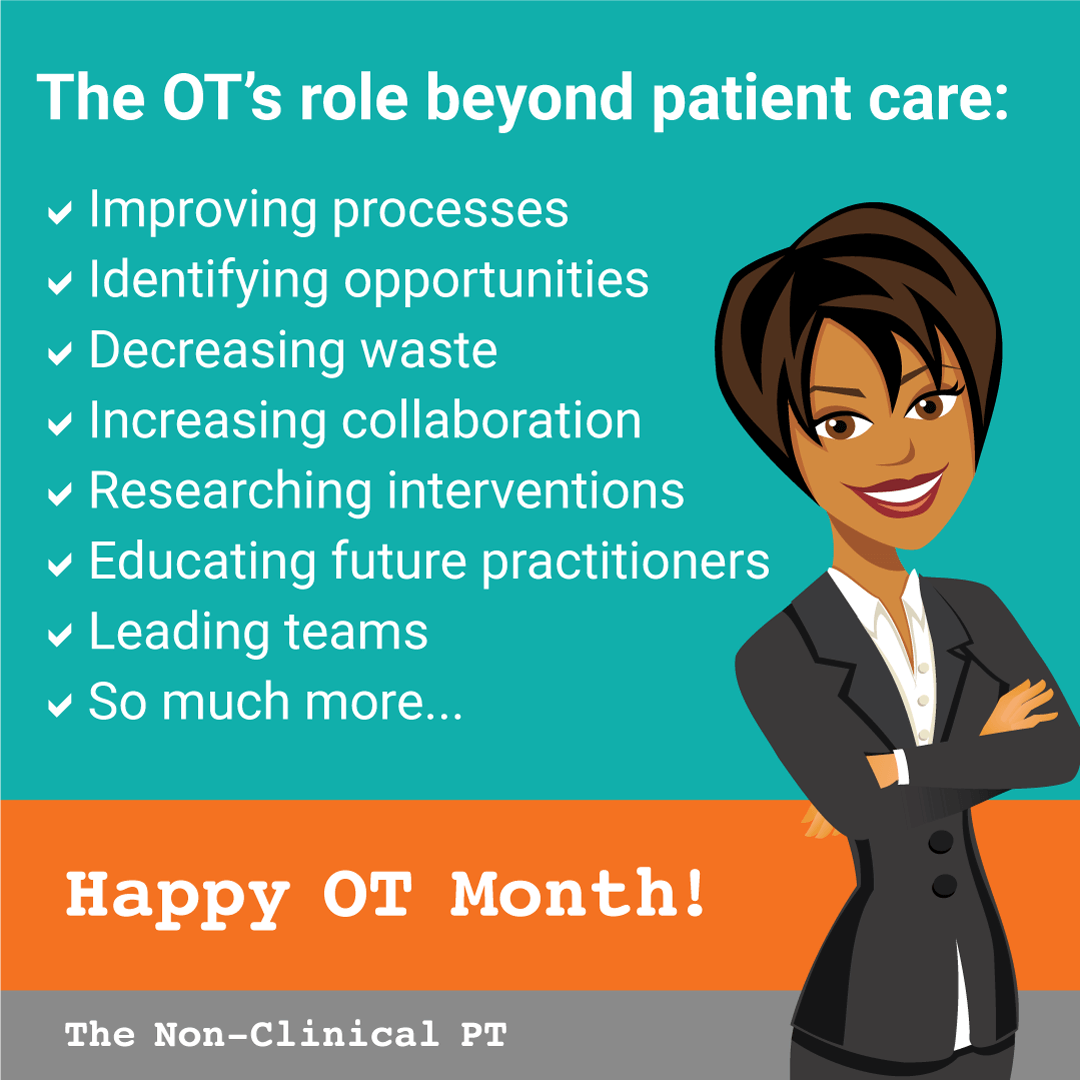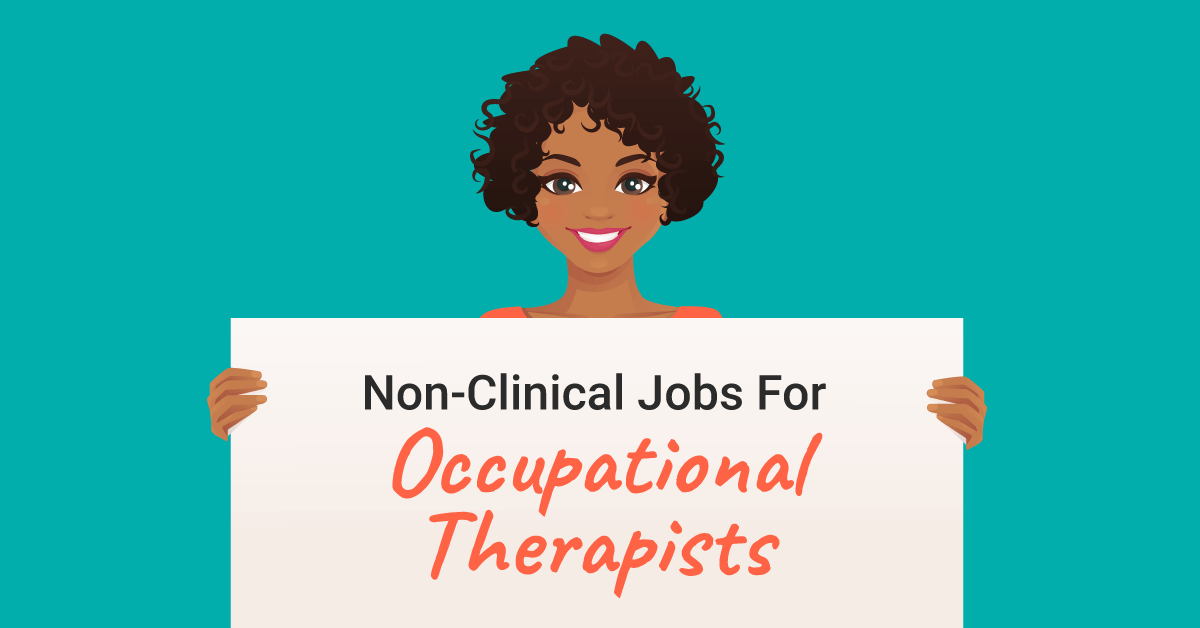For years, OT has been lauded as one of the best healthcare careers around…so, why would anyone want a non-clinical occupational therapy job?
While there are certainly some great OT jobs out there, perhaps you haven’t found the right fit. Or, maybe you used to like your work, but mounting productivity demands, stagnant pay, and and lack of flexibility have taken their toll.
You’re not a bad person if you feel depleted by the reality of today’s healthcare systems. And you’re not a sellout or greedy if you want a job with higher pay, more opportunities to advance, and increased flexibility.
Whatever your reason(s) for exploring non-clinical OT jobs, you’ll be pleased to know that there are tons of options. This article was designed to be your starting guide to the wonderful world of non-traditional, alternative, and non-clinical OT jobs.

Table of contents
- Why OT/As thrive in non-clinical careers
- Why occupational therapy professionals look for non-clinical jobs
- The top non-clinical occupational therapy jobs of 2024
- What other non-traditional/non-clinical OT jobs are out there?
- How to land non-clinical OT jobs
- Parting words about alternative occupational therapy jobs
This post may contain affiliate links or codes. This won’t increase your cost, but it helps keep TNCPT alive, and free of annoying ads! Thank you for your support. 🙂
Why OT/As thrive in non-clinical careers
OT professionals are some of the kindest people around. They are attracted to the field because they want to help people live their lives to the fullest. This truly good nature—combined with a holistic framework and user-focused lens—makes OT practitioners incredible problem-solvers and collaborators.
OT professionals’ natural tendency to collaborate and problem-solve is part of why they excel in the non-clinical world. Their ability to see the big picture of any project makes them an integral part of the team.
Think about it this way: without OT, a patient might be practicing climbing stairs simply to climb stairs. With OT, that same patient is climbing stairs to reach their child’s bedroom to sing lullabies and read bedtime stories.
Put an OT in a clinical informatics role, and they won’t just as, “How do we move this data over there?” They will ask:
- “Why are we moving this data?”
- “Who needs this data next?”
- “How is that person used to seeing data presented?”
- “What can we do to present the data in the most useful way?”
You get the point 🙂
And that’s really why we wrote this article. To create a resource for OTs so that when they crave change, they can embrace their OT roots and find fulfilling, meaningful work that blends their many talents with healthcare’s biggest needs.
Whew, time to hop off that soapbox!

Let’s look at some of the reasons why OTs might opt to seek non-clinical work.
Why occupational therapy professionals look for non-clinical jobs
Career growth
Many OTs are looking to stretch their wings, learn more, and advance professionally. Perhaps you’re seeking more recognition, more respect, or more opportunities when you consider unconventional occupational therapy jobs. All of these abound in the non-clinical world.
Financial opportunity
Many traditional clinical roles have glass ceilings, as far as income is concerned. You can only “see more patients to get more money” to a certain point. If you’re looking to increase your earning potential, non-clinical OT jobs can be the answer.
Feeling bored with clinical work
Patient care can be a bit repetitive, especially for variety-seekers. Some OT professionals want to leave patient care simply because they crave a new challenge.
Dealing with OT burnout (emotional or physical)
The whole “see more patients to get more money” mindset in clinical care often leads to burnout—which, in turn, leads to OTs seeking non-clinical occupational therapy jobs.
Curiosity
Some people are just plain curious to learn more about what’s out there! OTs tend to be a curious and motivated bunch, and the repetitive nature of patient care can lead them to seek greener pastures!
Without further ado, let’s dive into the top non-clinical jobs for OTs!
The top non-clinical occupational therapy jobs of 2024
We’re going to share the most popular (and easiest to land) jobs for OTs in this list. We do frequently revisit articles, and we will add and adapt as the professional climate evolves 🙂 If this list overwhelms you, don’t worry! Non-Clinical 101 walks you through the entire process of going non-clinical, saving you tons of heartache and time!
1) Clinical/rehab liaison
A clinical liaison (or rehab liaison) is responsible for helping to fill up an inpatient rehab facility (IRF)/acute rehab unit (ARU) with patients who are appropriate fits for short-term rehab. This is a role that blends relationship-building, marketing, sales, and clinical expertise. OTs are sought after for these roles because they excel at education, collaboration, and relationship-building, all of which are important in liaison work.
Your days will vary significantly when you’re a clinical liaison. You might spend one day screening potential patients, or you might spend another day working on insurance paperwork. Some other days might be spent in the field or in the community, working to build referral sources.
In order to qualify for these non-clinical occupational therapy jobs, you typically need a few years of experience in acute and/or inpatient rehab settings.
A clinical/rehab liaison role is ideal for someone who is goal-oriented, outgoing, organized, good at building relationships, and able to work both independently and on teams.
Pros
- You’re still educating patients and working with people, but you’re not in direct patient care or doing anything physical
- You’re still directly using your license, and you can’t do this role without experience and education as a therapist
- The pay can be on par with, or higher than, a standard therapist’s salary…especially when there’s a bonus structure
- Hours tend to be pretty flexible
- This is one of the easiest jobs to land directly from clinical work
Cons
- Sometimes, these roles are only available to therapists, not assistants (though there are many exceptions)
- You need to be a self-starter to thrive in these jobs, and you often have quotas to meet
- There’s limited direct upward mobility from these roles (though you can go into sales or marketing)
- You occasionally need to stay late or work on weekends in these roles
Here are some spotlights on clinical/rehab liaisons (or similar roles)!
- Natalie Perez – Rehab Liaison
- Amber Hammock – Clinical Rehab Liaison
- Krista Matalionis – Care Navigator

2) Data analyst
Data analysts are increasingly crucial roles in our changing healthcare landscape. With the shift toward value based care (which we’ll explain below as another non-clinical career option), there’s increased focus on outcomes.
How are outcomes measured? By collecting and analyzing data, of course!
Data analysts with clinical experience can be very valuable in all sorts of data-related roles within healthcare. Whether you’re analyzing past trends to understand the “why” behind them, or you’re forecasting future events or needs, your work is valuable, which is why this field is growing so quickly!
Pros:
- Predictable, calm schedules are the norm…no more running around scrambling to meet productivity
- Excellent pay potential
- Good for introverts and those who work well independently
- Bright future in healthcare
- Many roles are hybrid or fully remote
Cons:
- Upskilling and/or additional education typically needed to break into the field
- Can feel isolating if you are a people person
- Breaking into your first full-time data job can take some time
Here are some OTs in data analytics roles:
3) Clinical educator/trainer
A clinical educator (sometimes called a sales trainer or clinical trainer or hospital educator) is responsible for training individuals or groups on the use of a medical device or software platform. Clinical educators teach medical professionals how to operate equipment, use software (EMRs, etc.), and deliver services in specific ways.
Occupational therapists will frequently work as clinical educators in hospital settings, as well as in field trainer roles, where they cover territories and teach patients or clinicians (or both) how to operate medical devices or information systems.
In order to qualify for these roles, you need to have some experience with teaching (being a clinical instructor or adjunct instructor counts), and you often need to have worked with the device, software, or service to some extent during your career.
A clinical/hospital educator role is perfect for the OT or OTA who loves giving in-services and presentations, enjoys educating others, is organized, and doesn’t mind traveling for work (many roles do require travel).
Pros
- This is often considered a very fun and dynamic role
- These roles generally pays better than clinical roles, as there is often a performance bonus
- Clinical educator roles are often very flexible
Cons
- These roles can sometimes require quite a bit of travel (though this might be a pro for the right person)
- Many clinical educator roles go to nurses (think “nurse educator”) unless we push for them
- Some of these roles require evening or weekend work (or evening/weekend travel)
Here is a spotlight on an OT clinical trainer!

4) Educator/professor
This one probably doesn’t surprise you as much, because for years, the only non-clinical options for OTs seemed to be education or management. But some students actually want to become occupational therapists because they want to become educators from day one!
While most people think of OT professors when they think of educators, those in academia can work in numerous capacities. One can work in higher education or at an OTA program (as a program director or OT professor). There are tons of other options like teaching con-ed courses, working as an academic fieldwork coordinator, and even tutoring students at all levels.
OTs and OTAs can work in the education space, provided they know which roles they are qualified to fill.
An education role is perfect for the OT or OTA who has niched down in their career, truly enjoys teaching others and watching them succeed, and has (or is willing to obtain) the required degrees to qualify for the roles desired.
Pros
- Educators tend to garner quite a bit of respect within their professional, and in the general public
- There is generally quite a bit of flexibility and time off awarded in the academic world
- Education can be extremely fulfilling, especially for someone who enjoys nurturing others’ growth
Cons
- You generally won’t have a normal 9-5 schedule; you might be grading papers at night or on weekends
- The pay varies wildly, depending on the type of work you do in education
- The world of academia can be political
Here are some spotlights on OT educators:
- Twylla Kirchen – Occupational Therapy Program Director
- Jeannine Nonaillada – Assistant Dean
- Khalilah Johnson – Occupational Therapy Faculty

5) Clinical informatics specialist
A health informatics specialist or clinical informatics specialist role blends the worlds of IT and healthcare. OTs are already user-focused professionals who are excellent at problem solving and communicating. These non-clinical occupational therapy jobs are often a perfect match for the career-minded OT professional.
Clinical informatics professionals are tasked with all sorts of health information problems, such as improving processes, making workflows more efficient, and fixing the broken pile of unrealized dreams we call “electronic documentation” in hospital systems.
Clinical informatics is perfect for occupational therapists and assistants who are comfortable with technology, crave streamlining processes, and generally just enjoy solving problems.
Pros
- These roles truly leverage OT professionals’ best qualities: communication, education, problem-solving, and rapport-building
- Health informatics typically offers high pay with excellent growth potential
- The work is often very flexible, and some jobs offer some remote components
- You’re kind of leaving the occupational therapy profession in that you’re not really in rehab—but you’re still working in healthcare and using many of your transferable skills
Cons
- These jobs often require additional education or upskilling, which means coursework, certification programs, or additional degrees
- Given the types of problems you’ll be tackling, some roles might have days with long hours
- You can sometimes be caught between two sides and have to act as a peacemaker between clinicians and the IT team

6) Management and operations
Quite a few OTs go into management roles, but fewer ascend the ranks into upper management. That is likely because many of the roles that do go to OTs and OTAs (director of rehab, etc.) can set rehab professionals up for failure by requiring them to step in and treat patients when needed. Because “when needed” often translates into “every day,” it’s tough to accomplish the real tasks of the role, and OTs, PTs, and SLPs (and assistants) in these roles frequently find themselves facing a glass ceiling.
That said, you are very qualified to do what managers do: manage people. Do not shy away from management roles, because OT/As have the brains to excel at upper management.
These non-clinical occupational therapy jobs can be in operations, human resources, and other specialties, or you can set your sights high and aim for CEO! If you enjoy systems, structure, and helping to grow other leaders, you might want to go into healthcare management!
Pros
- By moving into upper management, you have the capacity to create true change in the broken system we call healthcare
- OTs in these roles can also elevate other rehab professionals into similar roles (through mentorship, providing informational interviews, etc.)
- These jobs generally offer generous salaries, especially as you move up the ranks
Cons
- You will often need additional education to move beyond director of rehab level
- It can be lonely at the top
- The more impressive your role, the longer hours you MIGHT be expected to work; this depends on the company culture
Here are spotlights of OTs in leadership:
- Jennifer Mitchell – Director of Rehabilitation Services
- Alyssa Chico – Learning and Development Specialist
- Sapna Ramanan – Area Director of Operations
- Asha Subramaniam – Director of Therapy Operations
7) Telehealth
Telehealth occupational therapy refers to diagnosis, interventions, and education about OT being delivered over remote means. It’s a huge trend in the occupational therapy world, and in the greater healthcare world at large.
Telemedicine (including telehealth OT and telehealth PT) is essentially the Wild West, so it’s always best to check with your state regarding whether you can practice, whom you can treat, how you can collect payment, and other considerations.
Telehealth occupational therapy is a great option for those who enjoy patient care, but crave more flexibility and less physical burden.
Pros
- You’re very much still using your degree and education
- Telehealth is growing quickly, and if you’re looking to niche down and have your own practice, now is a great time to beat the rush
- Hourly rates tend to be quite high if you’re working as a contractor with a company
Cons
- If you don’t enjoy patient care, you won’t be much happier in telehealth; it’s still patient care, minus the face time and physical components
- It’s difficult to find a full-time, benefited role as a telehealth occupational therapist
- Teletherapy can be challenging for those who have grown reliant on their hands for achieving therapeutic outcomes

8) Utilization reviewer
Utilization review (UR) is a great career for someone looking to reduce waste in healthcare. However, there’s no way to sugar-coat it. Reducing waste is good, but limiting visits can be bad. Utilization review (which is technically part of a broader term, utilization management), does involve finding that balance between awarding medically necessary visits to covered patients, and avoiding wasteful visits when therapeutic gains aren’t being made.
Becoming a utilization reviewer is a perfect solution for the OT who is looking to see things from the other side. You can work at insurance companies or at companies that contract with insurance companies or hospitals. Some health systems even have internal UR teams.
If you’re eager to reduce waste and fraud, and you’re a detail-oriented, decisive person, you’ll likely enjoy a career in utilization management.
Pros
- You still need a clinical license to practice, so you can really feel like you’re still using your degree and experience
- Work-from-home/remote options are plentiful in this field
- You will usually make around what you did as an OT
Cons
- Some UR companies don’t hire assistants, though there are some exceptions
- These roles can be productivity-based
- UR jobs do involve some calls with frustrated providers who argue over patient benefits
- These roles have become very competitive, and the average pay has decreased in this “seller’s market,” so to speak
Here are some spotlights on OT utilization reviewers!

9) Ergonomic/industrial rehab/driver rehab specialist
Occupational therapists are perfect fits for many ergonomic and industrial rehabilitation roles. These roles vary quite a bit, but they make use of the OT skillset. While they’re still sort of considered patient care, they’re definitely outside the traditional model, so they’re in this article! 🙂 We’re also including driver rehabilitation specialist in this section, because it similarly uses OT training and education, though in a more non-traditional way.
If you enjoy thinking like an OT, and you still want to work with clients, but you want to get out of the traditional clinical setting, these roles might be great for you!
Pros
- These roles are still keeping you in a client-facing position, so they feel familiar vs. jarring when you make the transition
- These roles tend to pay well, or around what you’d make as an OT
- Once you specialize or niche into these roles, you have a unique skillset that you can take with you to many different locations
Cons
- Roles can be hard to find; there usually aren’t many driver rehab programs in a given location, and you might need to wait for another OT to retire or move until you can have a shot
- Some of these roles are not full-time or benefited, or if they are, you have to do some time in patient care on top of the non-clinical work
- In some cases, you need specialized con-ed courses or certifications to stand out and land these roles
10) Rehab tech/startup employee
There are lots of really cool technology, medical, and general innovation companies out there, and many of them would love to have some experienced OTs and OTAs on staff. Generally speaking, you’ll find a lot of OTs working for cool startup companies. You might work in UX (user experience), consulting, testing, processes, or other roles in these companies.
OTs who wish to work in fast-paced, analytics-driven environments with collaborative teams would love working in tech startups.
→ Here’s a great article about how to land a role at a rehab tech startup as a PT, OT, or SLP!
Pros
- These jobs are super exciting; you’re not just finally getting to pee during the workday, but you’re building something new, and you’re often involved in every part of the process
- Startup and tech jobs tend to be very progressive with flexible hours, vacation time, and remote work
- If you work for a larger company, the pay can be quite solid
Cons
- Startup roles often don’t pay well, and you might be offered stocks or equity in exchange—but, given that many startups fail to be acquired, those shares could amount to nothing
- Lack of benefits and job security are sometimes a concern if you’re working for a smaller startup
- Depending on the role, you might work long days
Here are a few spotlights on rehab professionals who went the rehab technology route!
- Liz Rowe – Manager, Strategy & Insights
- Rebecca Tarbert – Director of Clinical Programs
- Lauren Souders – Clinical Manager
- Bree Fouss – Business Designer
- Janice Gross – Assistive Technology Professional (ATP)
- Anthony Guarriello – User Experience (UX) Researcher
- Susie Touchinsky – Driver Rehab OT
- Sarah Brzeszkiewicz – Clinical Advisor
- Lauren Sheehan – Field Clinical Manager
11) Entrepreneur
If you’re still wondering, “What else can I do with an OT degree?” keep in mind that OTs make fantastic entrepreneurs. Here are some of the best ways that savvy OTs can leverage their skills outside of direct patient care.
→ Occupational therapy consultant
Consulting is a fantastic way to take your professional expertise beyond the clinical setting. You can consult as a side gig or as a main focus, but it does require that you do the following:
- Identify a niche
- Understand your target clients
- Know how to be found (via the internet, word-of-mouth, etc.)
- Are comfortable setting prices on your services
- Are willing to sell yourself
- Are comfortable with wide variations in pay across months
Our flagship course, Non-Clinical 101, has a whole lesson AND bonus video about getting started as a consultant!
Here are a few spotlights on OT consultants!
- Laura Latimer – Founder of Nomadicare
- Iris Kimberg – Founder of NY Therapy Guide
- Tomeico Faison – CEO and Business Coach
- Rafi Salazar – Founder of Rehab U Practice Solutions
- Allison Chrestensen – Principal of Tandem Healthcare Solutions
- Priya Thakkar – Rehabilitation Consultant with Sun Life
→ Home modifications specialist
Home modifications is a great option for entrepreneurial PTs, OTs, and assistants. There are lots of great courses out there to get you started, but networking an marketing are really key to succeeding in the world of home mods. To learn more, b sure to check out Traci Swartz’s incredibly comprehensive article: Home Modifications Careers for OT and PT Professionals!

Here are a few spotlights on home mods professionals!
- Maria Lindbergh – Home Modifications Specialist
- Karen Frank (PT, but her husband and business partner is an OT) – CEO of GreenLight Mobility
→ Blogger/digital entrepreneur
Running an online business can be hard, but it pays off.
If you want a dose of inspiration, check out the spotlights of these inspiring online business owners!
- Clarice Grote – Amplify OT
- Sarah Lyon – OT Potential
- Mandy Chamberlain – Seniors Flourish
- Christina Connors – Child Inspired
- Brittany Ferri – Simplicity of Health
- Connie Sakellaropoulos – Independent Therapist Alliance
- Holly and Ali – Purpose Therapy Box
- Devon Breithart – Social Media Manager and The Dynamic School OT
- Susan Weiss – Exploring Hand Therapy
- Emily Calahan – ARC Seminars
- Courtney Smith – Marketing copywriter and owner of The Office On Call

What other non-traditional/non-clinical OT jobs are out there?
There are SO many others you can pursue, but this article is already too long. Here are just a few other ideas:
- Referral liaison
- Clinical consultant
- MDS coordinator
- Lactation consultant (lactation OT)
- Product manager
- Public health professional
- Client success manager/client success associate
- Clinical consultant
- Medical science liaison
- Chief operating offer
- Accessibility program manager
- Behavioral health practice facilitator
- Senior application development analyst
- Senior care navigator
- Patient engagement content manager
- Clinical ethicist
- Inclusive design
- SNF network manager
- Outcomes manager/PPS coordinator
- Customer project specialist
- Implementation specialist
- DBS senior clinical specialist
- Director of employee experience
- Client services supervisor
- Field clinical specialist
How to land non-clinical OT jobs
First of all, you have to look at this as your non-clinical OT career, not just a job.
If you want to switch gears, you’ve got a bit of work ahead, but it’s all very possible! You’ll want to explore what is right for you, and then be sure to search for the right jobs in the right places. The last thing you need to do is launch another career that you find unfulfilling.
A great place to start is with our flagship course, Non-Clinical 101. For each of the non-clinical career paths we cover, you’ll find numerous job titles and focuses, several non-clinical resume and cover letter templates, interviewing tips, and guidance on which skills and strengths best position you for the work. Plus, you’ll find personalized assessments to help you determine your own superpowers, not to mention interviewing strategies and proven tips to negotiate a higher salary in your new job!
Parting words about alternative occupational therapy jobs
When you explore alternative occupational therapy career options, you’re not abandoning OT as a profession, and you’re not abandoning your patients. You spent a lot of time, energy, and money to get where you are. Just because you don’t clinically practice, you are not any less of an OT.
You *can* use your experience in a new way, without leaving the occupational therapy profession altogether.
In a non-traditional occupational therapy job, you’ll still be using your valuable experience. Maybe you’re sick of googling “I hate being an occupational therapist,” or perhaps you simply want a new challenge. Regardless of your motivation, promise that you will continue to remain vocal and proud as an OT professional, no matter where you go with your career. You’ve earned it! 🙂





